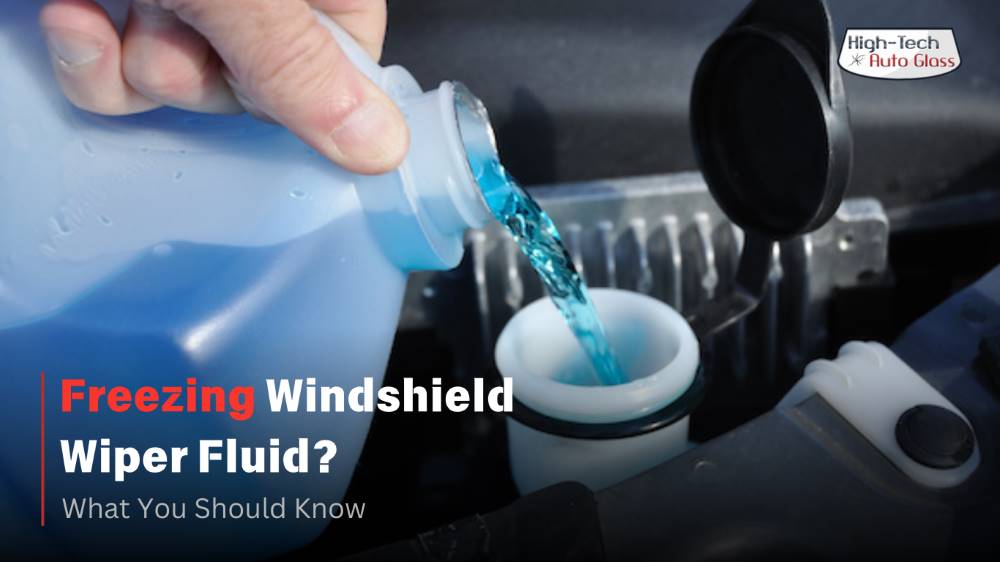Does Windshield Wiper Fluid Freeze?

Windshield wiper fluid helps keep your windshield clean so you can see clearly and drive safely. But when winter comes and temperatures drop, the fluid can freeze, making it hard to deal with bad weather.
By learning why the fluid freezes and how to stop it, you can stay safe on the road and avoid expensive fixes. Let’s look at what causes windshield wiper fluid to freeze and how to keep it ready for winter.
Does Windshield Wiper Fluid Freeze?
Windshield wiper fluid can freeze, particularly when temperatures drop below freezing. This is more likely with summer-grade wiper fluid, which has a lower alcohol content compared to winter-grade options. Understanding its freezing point and functionality as an antifreeze is key to winter preparedness.
What Temperature Does Windshield Wiper Fluid Freeze At?
The freezing point of windshield wiper fluid depends on its composition. According to YourMechanic, summer-grade fluids can freeze at temperatures close to 32°F (0°C), while winter-grade fluids are designed to remain liquid at much lower temperatures, often ranging between -20°F and -40°F.
Is Windshield Wiper Fluid an Antifreeze?
Some windshield wiper fluids function as antifreeze due to the addition of alcohol-based ingredients like methanol or ethanol. These components lower the freezing point, making the fluid effective in sub-zero conditions. However, not all wiper fluids are created equal; summer-grade fluids lack these antifreeze properties.
Do They Make Windshield Washer Fluid That Doesn’t Freeze?
Yes, manufacturers produce specialized winter windshield wiper fluids that are formulated to resist freezing even in extreme temperatures. These products often include higher concentrations of alcohol and other additives to ensure optimal performance during the coldest months.
Risks of Frozen Windshield Wiper Fluid
- Ice on the Windshield: Frozen fluid can lead to poor visibility by creating ice streaks or patches on the glass.
- Damaged Reservoir: Ice expansion can crack or burst the fluid reservoir, leading to leaks.
- Broken Wiper Pump: The wiper pump may become damaged when trying to push out frozen fluid.
Why Does Windshield Wiper Fluid Freeze?
Windshield wiper fluid freezes when temperatures drop below its freezing point, primarily due to its water content or lack of adequate antifreeze additives. Understanding the causes can help you prevent this issue and ensure your wiper system works properly in cold weather.
Causes of Freezing
- Water Content: Most wiper fluids contain a significant amount of water, which is the main component that freezes in low temperatures. When the temperature dips below freezing, the water in the fluid turns to ice, clogging lines and nozzles.
- Inadequate Antifreeze: Summer-grade wiper fluid lacks enough antifreeze agents, like methanol or ethanol, making it unsuitable for cold weather. Without these additives, the fluid’s freezing point remains too high for winter conditions.
- Dilution: Mixing wiper fluid with water reduces its antifreeze properties. Even winter-grade fluids can become less effective if diluted.
How to Identify Frozen Wiper Fluid
- Clogged Nozzles: If the fluid doesn’t spray when you activate the wipers, frozen lines or nozzles may be the issue.
- Visible Ice in Reservoir: Check the fluid reservoir for signs of ice or slush.
- Lack of Flow: A complete lack of fluid flow indicates freezing in the system.
Tips for Winterizing Wiper Fluid
Winterizing your windshield wiper fluid is essential for ensuring it remains effective in cold weather, preventing freezing, and maintaining visibility on icy days. Here’s how you can prepare your wiper fluid for winter conditions.
Choosing Freeze-Proof Fluids
- Use Winter-Specific Fluid: Opt for commercially available winter-grade windshield wiper fluid, which is formulated with de-icing agents to prevent freezing at temperatures as low as -20°F or even lower.
- Check the Temperature Rating: Always select a fluid that matches the lowest expected temperature in your region. This ensures your wiper system functions reliably even in extreme cold.
Using Additives to Lower the Freezing Point
- Add Rubbing Alcohol: If you’re using regular wiper fluid, mix in isopropyl alcohol (rubbing alcohol) to lower the freezing point. A common ratio is 1 part rubbing alcohol to 3 parts wiper fluid.
- Consider De-Icer Concentrates: These specialized additives can enhance the antifreeze properties of your existing wiper fluid, offering extra protection against freezing in sub-zero temperatures.
- Avoid Overdoing It: Adding too much alcohol or de-icer can impact the cleaning ability of the fluid, so follow recommended ratios for optimal performance.
Ensuring Proper Storage and Handling
- Keep the Reservoir Full: Regularly check and top off the wiper fluid reservoir to ensure it’s ready for use at all times.
- Store Unused Fluid Properly: Keep unopened bottles of wiper fluid in a dry, cool place to maintain their effectiveness.
- Inspect for Contamination: Make sure the reservoir is free from dirt, debris, or water that could dilute the fluid and reduce its antifreeze properties.
How to Handle Frozen Windshield Wipers
Dealing with frozen windshield wipers can be frustrating and potentially damaging if not done correctly. Here are practical steps to resolve the issue safely and effectively:
Steps to Handle Frozen Wipers
- Warm Up Your Car: Start the engine and let it run for a few minutes to allow the vehicle’s defroster to warm up. The heat will gradually loosen the ice around the wipers and windshield.
- Use a Dedicated Ice Scraper: Gently scrape the ice off the windshield using a plastic ice scraper. Avoid using the wipers as an ice scraper, as this can damage the blades and motor.
- Lift the Wiper Blades: Once the ice has softened, carefully lift the wiper blades away from the windshield. This ensures they won’t stick or tear when activated.
- Apply a De-Icing Spray: Use a commercial de-icing spray or a homemade solution (e.g., a mix of isopropyl alcohol and water) to melt stubborn ice around the wiper blades and windshield.
- Check for Ice Build-Up on the Blades: Inspect the wiper blades for any remaining ice or snow. Gently remove any residue to prevent streaking or damage during operation.
- Avoid Forcing the Wipers: Never force frozen wipers to move. This can damage the wiper motor or tear the blades.
Preventive Measures
- Use Winter-Grade Washer Fluid: Fill the reservoir with a formula that includes de-icing properties to prevent ice build-up on the windshield and wipers.
- Install Winter Wiper Blades: These are designed to resist freezing and perform better in extreme cold conditions.
- Lift Wiper Blades When Parking: In snowy or icy conditions, lift the wiper blades away from the windshield before leaving your car to prevent them from freezing in place.
- Park in a Garage: Whenever possible, park in a sheltered or heated garage to minimize exposure to freezing temperatures.
By following these steps and taking preventive measures, you can handle frozen windshield wipers effectively and ensure they’re ready to perform when needed.
Conclusion
Preventing windshield wiper fluid from freezing is essential for maintaining clear visibility and ensuring safe driving during winter. By understanding the causes of freezing, using winter-grade fluids, and taking preventive measures, you can avoid the inconvenience and risks associated with frozen wiper systems.
However, extreme cold can take a toll on more than just your wiper fluid. If your windshield gets cracked or damaged, it’s crucial to address the issue promptly to ensure your safety. That’s where High-Tech AutoGlass comes in.
We specialize in windshield replacement services in Phoenix and surrounding areas, offering reliable and professional solutions for all your auto glass needs. Don’t let a damaged windshield compromise your safety this winter. Trust High-Tech AutoGlass for expert care and top-quality service.
Contact us today to schedule your windshield replacement or learn more about how we can assist you in keeping your vehicle winter-ready.
Frequently Asked Questions
What should I do if my windshield washer fluid is frozen?
If your windshield washer fluid is frozen, park your car in a warm garage to let it thaw naturally. Alternatively, pour warm (not hot) water over the reservoir or use a de-icing spray. Once thawed, replace the fluid with a winter-grade formula to prevent freezing again.
Does windshield washer fluid freeze in winter?
Yes, windshield washer fluid can freeze in winter if it’s not designed for low temperatures. Summer-grade fluids freeze at around 32°F, whereas winter-grade fluids remain liquid even at -20°F or lower.
How can I unfreeze windshield wiper fluid quickly?
To unfreeze windshield wiper fluid, warm up the car and run the defroster. If the reservoir is accessible, gently heat it using a hairdryer or pour warm water on it. Avoid using hot water, as it may damage the reservoir.
Can washer fluid freeze inside the nozzles?
Yes, washer fluid can freeze inside the nozzles, especially if the fluid lacks antifreeze properties. Clearing the nozzles with a pin or applying a de-icing spray can resolve this issue.
What happens if I use summer windshield washer fluid in winter?
Using summer-grade windshield washer fluid in winter increases the risk of freezing, which can clog the system and damage components like the reservoir or washer pump. Switch to winter-grade fluid to avoid such problems.
Is windshield washer fluid the same as antifreeze?
No, windshield washer fluid is not the same as engine antifreeze. However, winter windshield washer fluid contains alcohol-based additives that act as antifreeze to prevent it from freezing in cold weather.
Why is my wiper fluid not spraying in cold weather?
If your wiper fluid isn’t spraying in cold weather, it could be due to frozen fluid in the lines or nozzles. Warm the car, clear the jets with a pin, or use a de-icing solution to resolve the issue.
Can you prevent windshield washer fluid from freezing?
Yes, you can prevent windshield washer fluid from freezing by using a winter-grade formula, adding isopropyl alcohol to the fluid, and parking the car in a garage during extreme cold. Regular maintenance and inspection also help avoid freezing problems.
